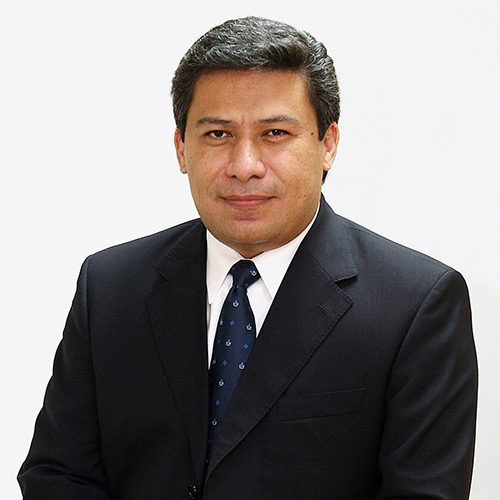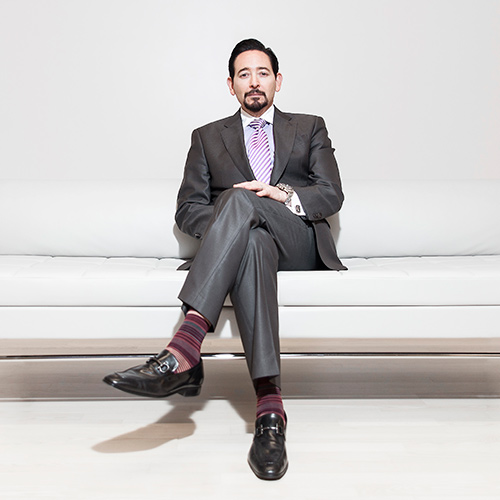Just over one year ago, Manuel Abud was named president and CEO of Azteca (originally known as Azteca América until May 2014). Already, Abud has made waves, both within the company and the television network industry at large. With Azteca reaching over 21 million viewers last summer, Abud’s efforts to create unique and socially conscious content have already attracted a measurably wider audience.
“I feel very fortunate to be at the epicenter of the tremendous revolution that is taking place now,” Abud says. “And I am proud to say that Azteca America, the second-largest producer of Spanish-language content in the world, has a much stronger brand and more solid programming than ever before.”
With over 20 years in the television network industry under his belt, Abud brings a wealth of experiences and a proven track record to Azteca. Prior to joining the company, he was with Telemundo, in various leadership positions from Los Angeles to Dallas. During his tenure there, he led the launch of Mun2—otherwise known as NBC Universo—a bilingual network aimed at Latino American audiences. Prior to that, Abud served as president of CBS Telenoticias and successfully relaunched the network as Telemundo Internacional.
“I came to Azteca with a combination of skills and experiences,” he says. “I feel I am able to reach our audience frankly and directly because I understand what they want, and I have the capacity to make the necessary changes at the executive level. There is a lot of talent out there, and we are putting it to work in ways that entertain and enrich people’s daily lives.”
Abud believes that this is the golden age of content, driven by audiences that are pickier and savvier than ever before. “People know what they want and where to find it,” he says. “We have responded by creating an improved distribution platform and are tailoring our programs to fulfill our audience’s needs.”
El Plato Fuerte: Soccer as Azteca’s Main Course
Last October, Azteca delivered the best season-to-date ratings for its broadcast of the Tijuana vs. America Mexican Soccer League match, outperforming competitors like Univision and UniMas.
“Soccer games are our most popular programs,” Abud says. “Viewers flock to soccer-related programs because soccer is the most widely played sport in our community, and people feel a strong connection with their home teams. Our commitment is to keep viewers well informed.”
Azteca exclusively broadcasts two weekly primetime matches, Viernes Futbolero and Sábado Fútbol Estelar. The network also features all home games for Xolos de Tijuana, Monarcas Morelia, Santos Laguna, and Club Atlas teams.
Last April, the network added Viernes Futbolero Tiempo Extra, hosted by Troy Santiago, the only local live Spanish-language sports show broadcast in Los Angeles. The show includes guest commentators and special segments like “Deporte al Extremo,” featuring extreme-sports clips, and “El Fan de la Semana,” featuring live participation of an audience member.
La Telenovela Como Nunca Antes:The Updated Telenovela
Among the major trends currently happening with Spanish-language programming, both in the United States and in Mexico, is a shift in the presentation of the ever-popular telenovela soap opera, regarding themes and settings.
“It used to be a Cinderella story,” Abud says, laughing, “with the poor girl marrying the rich guy at the end.
But our values are placed differently now, and audiences are now drawn to more action-packed stories, like a telenovela featuring a woman who is part of the armed forces.”
Not Imitating, Adapting
Conscious of the fact that the Azteca audience is made up of a diverse group of people who have different experiences and interests, Abud makes sure that US programming for Azteca complements the made-in-Mexico programs with others produced specifically for the US-based Hispanic population.
“We don’t copy Mexican programs, though we follow them closely,” Abud says. “Programming at Azteca, from newscast to entertainment, is designed for our unique audience. We make whatever changes are necessary in format and style.”
One of Azteca’s most popular programs is La Hora Ganadora, which Abud calls “a solid hour or programming for the entire family to enjoy.”
“It includes dance competitions like Baila Si Puedes—much like Dancing with the Stars—and game shows like Escape Perfecto. People love it!”
Impacto Social
Social responsibility is a key component of Azteca’s corporate values; the company carries out a number of community-growth initiatives and campaigns through its foundation, Fundación Azteca America. One example is Esperanza Azteca, intended to help underprivileged children develop leadership skills and gain achievement through music.
“There are 80 youth orchestras in Mexico,” Abud says. “Last year we founded the first US-based orchestra in Los Angeles, which has brought musical education and lessons on discipline and teamwork to a number of children.”
The network also partners with the Children’s Miracle Network Hospitals in the campaign “Salvé Un Angelito … ¡Te Toca!” “With it, we were able to share with our viewers the inspiring stories of survival of many children, their families, and committed hospital workers,” Abud says. “We also raised funds for the hospitals and increased public awareness about their needs.”
Viva la Revolución
The entertainment business is going through a tremendous transformation, but Abud is positive there is a special place for Azteca America in the digital revolution.
“Hay para todos,” he concludes. “There is something for everyone. At the end of this race, here at Azteca America, we just want the public to win.”

